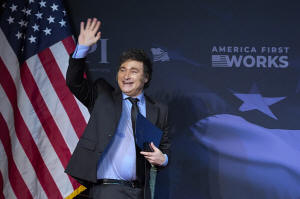In Milei's latest drastic move, Argentina is sole UN holdout voting 'no'
to ending gender violence
 Send a link to a friend
Send a link to a friend
 [November 16, 2024]
By ALMUDENA CALATRAVA and ISABEL DEBRE [November 16, 2024]
By ALMUDENA CALATRAVA and ISABEL DEBRE
BUENOS AIRES, Argentina (AP) — The usual suspects abstained from voting
on a seemingly uncontroversial United Nations resolution that denounced
violence against women and girls on Thursday — Iran, Russia, North
Korea.
But the country casting the sole vote against the nonbinding resolution,
drafted by France and the Netherlands, took the world by surprise. It
was Argentina, long considered one of Latin America’s most socially
progressive countries.
Unleashing an avalanche of criticism across the political spectrum on
Friday, the ‘no’ vote by Buenos Aires marked the latest in a series of
dramatic foreign policy shifts under President Javier Milei, the most
right-wing leader in Argentina's 41 years of democracy.
It comes just days after Milei, an outspoken climate change skeptic,
abruptly called Argentina's negotiators home from the U.N. climate
summit in Baku, Azerbaijan, stirring concerns that the radical economist
might seek to emulate former U.S. President Donald Trump in withdrawing
Argentina entirely from the 2015 Paris climate agreement.
Not only has Milei transformed Argentine foreign policy in line with the
United States and Israel, his government has also taken fringe positions
on the global stage that fly in the face of the liberal, rules-based
international order.
“It's a big break with standard Argentine foreign policy, which has long
been oriented toward making Argentina an integrated part of the Global
South,” said Richard Sanders, a global fellow at the Woodrow Wilson
International Center for Scholars and former State Department official
in the region. “It’s a definitely a significant change in how Argentina
relates internationally.”
Argentina's vote at the U.N. Thursday recalled a similar clash last
month when Argentina became the only member of all the Group of 20
nations to sign onto a statement adopting language about gender
equality.

“Argentina votes alone, against the rest of humanity,” the conservative
party of former President Mauricio Macri, an ally of Milei’s government,
wrote on social media platform X Friday.
Another centrist party, the Unión Cívica Radical, joined the chorus of
local condemnation.
“By fighting imaginary cultural battles we end up isolated from the
world,” said Senator Martín Lousteau, president of the centrist party.
Lousteau denounced Argentina’s U.N. vote opposing an end to gender
violence as a “disgrace.” Top official Guillermo Francos defended the
decision, saying “neither commitments nor treaties will solve the issue
of gender violence.”
Nearly a year into his presidency, the former Argentine TV pundit
remains erratic and idiosyncratic in the global spotlight, in striking
similarity to Trump. Milei became the first foreign leader since the
U.S. election to meet Trump, albeit informally, late Thursday at the
president-elect's private Mar-a-Lago club in Florida.
In a congratulatory phone call with Trump earlier this week, Miei's
spokesperson reported that Trump told the Argentine leader: “You're my
favorite president." Trump has not confirmed the claim.
The Argentine presidency on Friday proudly released a stream of photos
from Mar-a-Lago featuring Milei in a sharp suit beaming alongside Trump
and tech billionaire Elon Musk, with whom Milei has also publicly
cultivated a bromance over their shared contempt for “wokeness," gender
issues and socialism.
[to top of second column]
|

Argentina's President Javier Milei arrives to speak before
President-elect Donald Trump during an America First Policy
Institute gala at his Mar-a-Lago estate, Thursday, Nov. 14, 2024, in
Palm Beach, Fla. (AP Photo/Alex Brandon)

In November 2023, an angry Argentine electorate fed up with sky-high
inflation, debt defaults and bank runs handed the outsider a
sweeping mandate to carry out an overhaul of Argentina's
crisis-stricken economy.
But along with Milei's libertarian crusade has come a series of
cultural battles — both at home, where the president eliminated
Argentina's women’s and environment ministries and scrapped the
national anti-discrimination institute, as well as abroad, where
Milei has sought to fashion himself as a far-right icon, raising the
hackles of key allies like Braziland Spain.
“Milei got into the presidency on the basis of his clearly stated
libertarian views, it was all about the economy,” Sanders said. “But
these other views are nothing he kept hidden.”
Tensions over Milei's culture war escalated this month. When
Argentina voted at the U.N. in favor of ending the American economic
embargo against Cuba on Oct. 30, Milei fired then-Foreign Minister
Diana Mondino over what he called her “unforgivable mistake” and
swiftly replaced her with Gerardo Werthein, a wealthy businessman
who had been Buenos Aires’ ambassador to the U.S.
This weekend, Milei and Werthein plan to meet Trump again at the
Conservative Political Action Conference in Orlando, Florida.
Experts say that Milei hopes to cash in on his friendship with Trump
to help crisis-stricken Argentina secure a much-needed infusion cash
infusion from the International Monetary Fund, to which Argentina
owes over $44 billion. The U.S. is the fund’s largest shareholder.
In recent weeks, Milei's shock dismissal of Argentina's top diplomat
— a polished political performer who frequently worked to mend
diplomatic relations strained by Milei’s profanity-laden fights with
traditional allies — has sent shivers through Argentina's diplomatic
ranks.
Milei has vowed to purge his foreign ministry of so-called “traitors
to the country” who have strayed from his stance, which includes
rejecting the “Pact for the Future” adopted by the U.N. in September
that promotes climate action, female empowerment and the regulation
of artificial intelligence.
Local media has reported the forced resignations of at least seven
diplomats in recent weeks who were perceived as critical of the
president's Trump-like attacks on the collective philosophy of the
U.N. Milei accuses such multilateral forums of restricting members’
freedom.
Argentina's left-leaning Peronist movement — which has dominated the
country's politics for decades — was seething Friday, with lawmakers
aghast at what they saw as the unraveling of hard-won social gains
like Argentina's breakthrough legalization of abortion in 2020 and
recent efforts to curb fossil fuels.
“For you, freedom is violence,” said Mayra Mendoza, a prominent
Peronist politician on Friday, addressing Milei.
The libertarian has called abortion “murder," climate change a
“socialist lie" and the U.N. a “leviathan with multiple tentacles.”
___
DeBre reported from Lima, Peru
All contents © copyright 2024 Associated Press. All rights reserved |